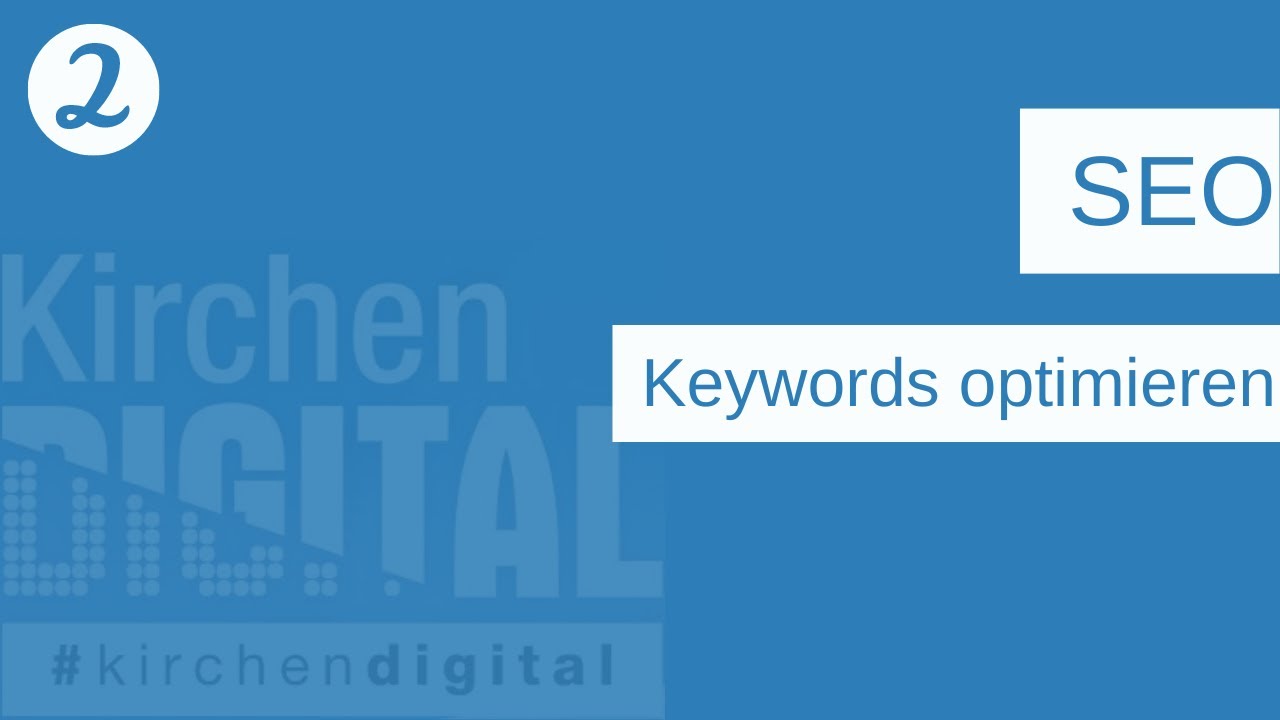SEO | (2) Auf die richtigen Keywords kommt es an
[Music] Hello everyone! Welcome to the second
video on the topic of “SEO” from #KirchenDigital. In this part, together with
your speaker Monique Schumacher, you will focus on the topic of “keywords”, a very central
component in search engine optimization. You will look at special types of keywords,
including the so-called “long-tail keywords”, and find out why
considering the search intention is essential. By the way:
You can find all videos on the topic of “SEO” in our playlist. For more useful tutorials, be
sure to subscribe to this channel. Hello from me too! Many people say that keywords
are no longer that relevant; we don't actually need them. But that's
not true. In this video I would like to explain to you what keywords are for, how they are put together
and why they are important in search engine optimization . Let's get started!
What exactly are keywords and what are they used for? Simply put,
the term “keyword” refers to the search query in a search engine.
The term that
you enter into the Google search bar at the top is the keyword. When you type a keyword into the
search bar, you usually want to know something. So for example: What is the special
church money? It would also be conceivable that you want to buy a specific product or service
– for example a hymn book – or that you want to download a document. Or maybe
you use a keyword because you want to visit a specific place, for
example the city church in the next big city. We refer to this intention that a user
pursues with his or her search as “search intention”. When
we create search engine optimized content, it is fundamentally important to take the user's search intention
into account.
For example, it makes no sense to write a
long text about the history of hymn books if the
user is actually just looking for a site where he
or she can buy a hymn book. Now let’s take another look at why
keywords are so relevant for us website operators . I would like to illustrate this to you with
an example. Imagine that you want more information about joining the church
. Then enter “church entry” into the search bar.
So “church entry”
is the keyword in this case. Now it is the case that the Protestant Church should appear at the
top of the search results for the keyword “church entry”
so that users can reach the Evangelical Church page and
receive all the necessary information there. In order for the Evangelical Church to succeed in this, it must
have a high degree of relevance to the topic. And this needs to be clear not only to the people searching for this
keyword, but also to the search engines. And so that the search engines understand that our
page is relevant for the respective keyword, it is important to cleverly integrate this keyword, i.e. “church entry,”
into our page content. But the keyword “church entry” does
n’t necessarily do it. Users often
enter similar and related search terms when they are looking for specific information
.

This can be, for example, “enter the church” or “church entry point”
. And some users are also looking for much more specific things: for example, for
“church entry after leaving” or for “church entry costs”.
The Evangelical Church should address all of these aspects on its website in order to be perceived as the first responder to the
topic of church entry not only by users, but also by the search engine
.
If we make additions to our keyword , i.e. not only look at “joining the church”
, but also more specifically “joining the church after leaving”, then
we are also talking about a so-called “long-tail keyword”. Long-tail keywords are entire search phrases
that are made up of several search words. In order to find out which keywords
users use when they search for a specific product,
service or information, keyword research is necessary.
This also allows us to identify precisely how often these keywords
are entered into the search bar. And therefore also how worthwhile it is
to optimize for a specific keyword. Keyword research should always
precede any text creation on your website. I'll tell you in the next video how best to proceed with such keyword research
and which tools you can use
. If you don't have the time or expertise to
do such keyword research for your site, you can enlist the help of a professional
SEO agency. As part of keyword research, this analyzes
your keyword profile in detail, compares it with the competition's keyword sets
and uncovers unused potential.
I recommend that you also take another look
at the link list at the end of this video. There you will find further useful information about the
topic of keywords. I hope you have fun! [Music].



